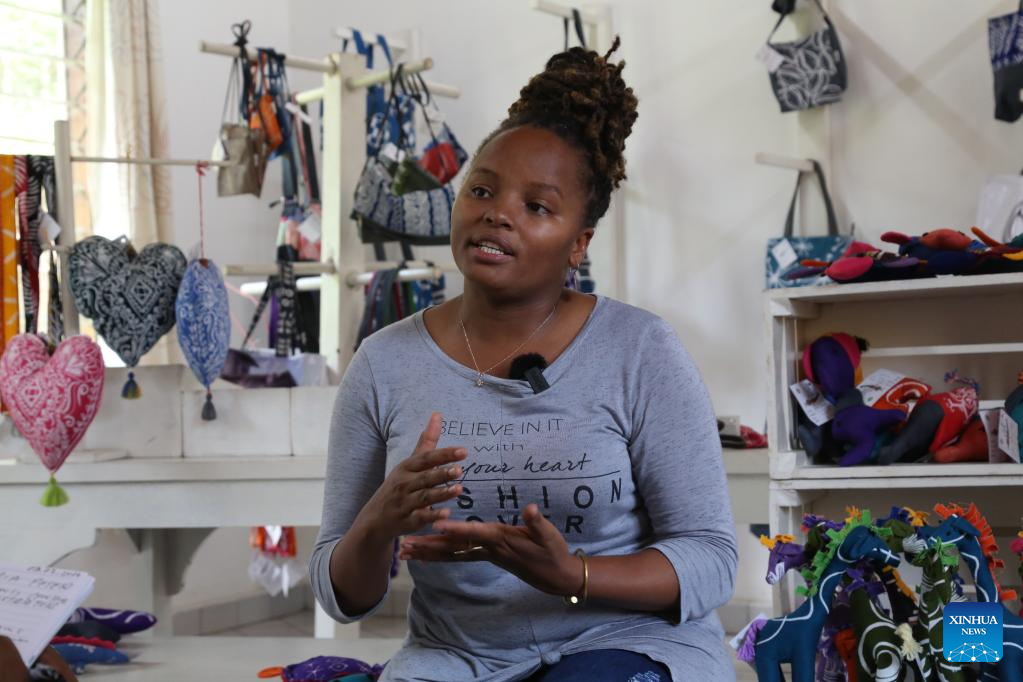
The Mabinti Center Administrator Maria Peter speaks during interviews at the Comprehensive Community Based Rehabilitation Tanzania (CCBRT) in Dar es Salaam, Tanzania on Feb. 3, 2022.
Seven women who have fully recovered from obstetric fistula treatment are busy in a room making high quality handmade bags, accessories and toys.
These women have benefited from the specialized healthcare services operating in Dar es Salaam and Moshi in Tanzania, sponsored by the Comprehensive Community Based Rehabilitation Tanzania (CCBRT), a locally registered non-governmental organization (NGO). (Photo by Herman Emmanuel/Xinhua)
DAR ES SALAAM, Feb. 4 (Xinhua) -- Seven women who have fully recovered from obstetric fistula treatment are busy in a room making high quality handmade bags, accessories and toys.
These women have benefited from the specialized healthcare services operating in Dar es Salaam and Moshi in Tanzania, sponsors by the Comprehensive Community Based Rehabilitation Tanzania (CCBRT), a locally registered non-governmental organization (NGO).
From its inception in 1994 as a provider of community-based rehabilitation, CCBRT has become the largest provider of disability and rehabilitative services in the east African nation.
The seven women have been trained by the Mabinti Center, operating under CCBRT at Masaki in Dar es Salaam, since 2009 to empower women recovering from fistula surgery by teaching them vocational skills and entrepreneurial skills so that they can start their own business.
The center also offers employment to graduates of the program like Mary Vivian Maziku, 29, a resident of Kinondoni suburb and a mother of a three-year-old son, who was trained at the center in 2014 and was employed by the center in 2015.
"I learned about Mabinti Center when I was being treated for fistula by CCBRT in 2013. My message to the community is that we should not stigmatize fistula patients because the disease is treatable," Maziku told Xinhua in an interview on Friday while busy making a bag.
The center is part of CCBRT's holistic model of care for women recovering from obstetric fistula, a childbirth related injury caused by prolonged or obstructed labor without timely medical intervention.
The consequences of fistula are life shattering in which women with fistula suffer from chronic incontinence and 90 percent of women lose their babies during childbirth, according to CCBRT.
"As a result of the injury, these women are often abandoned by their families and rejected from their communities, forced to live in shame and isolation," CCBRT says.
Mariam Bakari Sobo, 30, a resident of Mbagala suburb and a mother of a nine-year-old son, said she joined the center in May 2019 and graduated in December 2019.
"I joined the center after I was treated from fistula in February 2016 and recovered fully," said the soft-spoken woman, adding that she was referred to CCBRT by Temeke government hospital.
"Since I was employed here I have obtained a sewing machine, and I have started my small tailoring business at home that gives me extra income for looking after my family," said Sobo.
Maria Peter, the administrator for the center since November 2019, told Xinhua that since its establishment, the center has trained more than 170 women that have recovered from obstetric fistula.
"Each year the center runs two classes each with 12 women. Some of them are sponsored by various organizations and some of them are funded by the center from the money it earns from selling the goods it makes," said Peter.
She said the center makes a follow-up of their graduates to know their progress annually, and at the same time the center calls them on monthly basis to monitor their progress.
"All the raw materials used at the center, mostly canvas, are obtained locally," said Peter, adding that the center also recycles discarded billboards to make goods like shopping bags.
She said the center's goods made by the women are bought by foreign tourists and government institutions, adding that the center has a shop at the Slipway peninsular in Dar es Salaam.
After the training program, each graduate is supplied with a business starter kit containing a sewing machine, scissors, a supply of fabric and a calculator, said Peter.
"The women then return to their communities, equipped with the knowledge and resources needed to start their businesses and rebuild their lives," she said.
Peter said the center is focusing on expanding its revenue-generating activities to support the training of more fistula survivors and provide more women with a sustainable income.
CCRBT treats an average of over 100 women with obstetric fistula annually, but as many as 3,000 women develop obstetric fistula each year in Tanzania. ■
